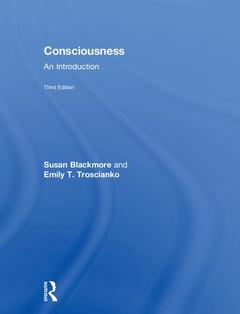Consciousness (3rd Ed.) An Introduction
Auteurs : Blackmore Susan, Troscianko Emily T.

Is there a theory that explains the essence of consciousness?
Or is consciousness itself an illusion?
Am I conscious now?
Now considered the 'last great mystery of science', consciousness was once viewed with extreme scepticism and rejected by mainstream scientists. It is now a significant area of research, albeit a contentious one, as well as a rapidly expanding area of study for students of psychology, philosophy, and neuroscience.
This edition of Consciousness, revised by author team Susan Blackmore and Emily Troscianko, explores the key theories and evidence in consciousness studies ranging from neuroscience and psychology to quantum theories and philosophy. It examines why the term ?consciousness? has no recognised definition and provides an opportunity to delve into personal intuitions about the self, mind, and consciousness.
Featuring comprehensive coverage of all core topics in the field, this edition includes:
- Why the problem of consciousness is so hard
- Neuroscience and the neural correlates of consciousness
- Why we might be mistaken about our own minds
- The apparent difference between conscious and unconscious
- Theories of attention, free will, and self and other
- The evolution of consciousness in animals and machines
- Altered states from meditation to drugs and dreaming
Complete with key concept boxes, profiles of well-known thinkers, and questions and activities suitable for both independent study and group work, Consciousness provides a complete introduction to this fascinating field. Additional resources are available on the accompanying companion website: www.routledge.com/cw/blackmore
Introduction, Section One: The problem, 1. What’s the problem? 2. What’s it like to be…? 3. The grand illusion, Section Two: The brain, 4. Neuroscience and the correlates of consciousness, 5. The theatre of the mind, 6. The unity of consciousness, Section Three: Body and world, 7. Attention, 8. Conscious and unconscious, 9. Agency and free will, Section Four: Evolution, 10. Evolution and animal minds, 11. The function of consciousness, 12. The evolution of machines, Section Five: Borderlands, 13. Altered states of consciousness, 14. Reality and imagination, 15. Dreaming and beyond, Section Six: Self and other, 16. Egos, bundles, and theories of self, 17. The view from within?, 18. Waking up
Susan Blackmore is a psychologist, TED lecturer, and writer researching consciousness, memes, meditation, and anomalous experiences, and is Visiting Professor in Psychology at the University of Plymouth. The Meme Machine (1999) has been translated into 16 languages; more recent books include Zen and the Art of Consciousness (2011) and Seeing Myself: The New Science of Out-of-BodyExperiences (2017).
Emily T. Troscianko is a writer and researcher interested in mental health, readers’ responses to literature, and how the two might be linked – as well as what both have to do with human consciousness. She is a Research Associate at The Oxford Research Centre in the Humanities (TORCH), University of Oxford, writes the blog 'A Hunger Artist' for Psychology Today, and has published a monograph, Kafka’s Cognitive Realism (2014), exploring the strange phenomenon we call the ‘Kafkaesque’.
Date de parution : 04-2018
18.9x24.6 cm
Date de parution : 04-2018
18.9x24.6 cm
Disponible chez l'éditeur (délai d'approvisionnement : 14 jours).
Prix indicatif 48,88 €
Ajouter au panierThème de Consciousness :
Mots-clés :
Tamil Nadu; Nuclear Magnetic Resonance; Consciousness; Young Man; Emily T; Troscianko; Grapheme Colour Synaesthesia; Philosophy; Tai Chi; Psychology of Mind; Minimally Conscious States; Memes; Integrated Information Theory; the hard problem; Cortical Disinhibition; 4e cognition; Global Workspace Theory; replication crisis; Lucid Dreams; neuroscience; Inattentional Blindness; cognitive science; Vice Versa; metacogniton; Greatest Divide; panpsychism; Bundle Theory; quantum physics; Hui Neng; belief; Multiple Drafts Theory; altered states; Rem Sleep; meditation; Global Workspace; free will; Binocular Rivalry; self dreaming; Cm; drugs; Synaesthetic Colours; AI; Philosopher’s Zombie; psychology; Reflexive Monism; Susan Blackmore; NREM Sleep; Split Brain Patients



